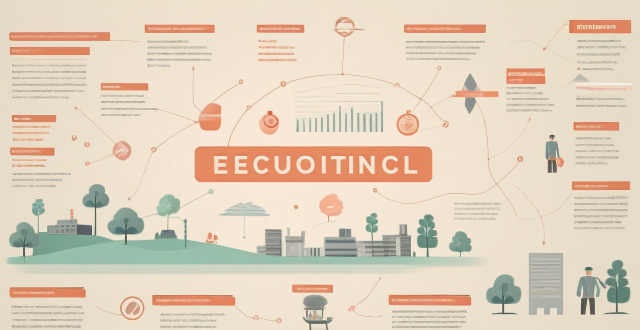Climate cooperation has a positive impact on global economic growth by fostering new industries, promoting international trade and investment, stimulating innovation and research, enhancing resilience against climate impacts, and encouraging policy coherence and stability.

Impact of Climate Cooperation on Global Economic Growth
Climate cooperation refers to the collaborative efforts of countries, organizations, and individuals to address climate change and its associated challenges. This cooperation involves various activities such as reducing greenhouse gas emissions, promoting renewable energy sources, and implementing sustainable development practices. The impact of climate cooperation on global economic growth can be analyzed from several perspectives.
1. Creation of New Industries and Job Opportunities
Climate cooperation encourages the development of new industries and job opportunities in areas such as renewable energy, energy efficiency, and sustainable agriculture. These sectors not only contribute to reducing carbon emissions but also generate economic growth by creating employment opportunities and stimulating innovation.
Examples:
- Renewable Energy Sector: Countries collaborating on climate action often invest in wind, solar, and hydroelectric power projects, leading to job creation in manufacturing, installation, and maintenance of these technologies.
- Energy Efficiency: Cooperation promotes the adoption of energy-efficient buildings, appliances, and industrial processes, resulting in job opportunities for engineers, architects, and technicians specializing in energy conservation.
- Sustainable Agriculture: Joint efforts in sustainable farming practices create demand for agronomists, researchers, and farmers focused on regenerative agriculture techniques that reduce environmental impact while maintaining food security.
2. Promotion of International Trade and Investment
Climate cooperation fosters international trade and investment by establishing common standards and regulations for low-carbon products and services. This harmonization facilitates cross-border transactions and attracts foreign direct investment (FDI) into green technologies and infrastructure projects.
Benefits:
- Access to Global Markets: Companies producing eco-friendly goods can access larger markets through international trade agreements that prioritize climate-friendly products.
- Attracting FDI: Countries with robust climate policies and clean technology sectors become attractive locations for foreign investors seeking to capitalize on growing demand for sustainable solutions.
- Enhanced Competitiveness: Businesses adopting cleaner production methods gain a competitive edge in global markets where consumers increasingly prefer sustainable options.
3. Stimulation of Innovation and Research
Collaborative efforts in climate action drive innovation and research in various fields, including clean technology, climate modeling, and ecosystem restoration. This research not only contributes to mitigating climate change but also leads to technological advancements that can be commercialized for economic gains.
Outcomes:
- Technological Breakthroughs: Joint research projects between nations or private-public partnerships result in groundbreaking discoveries like improved battery storage for renewable energies or innovative materials for carbon capture.
- Commercialization of Research Findings: Many research outcomes related to climate change adaptation and mitigation have practical applications that can be turned into profitable businesses or cost-saving measures for existing ones.
- Skill Development: Investment in climate-related education and training programs prepares a skilled workforce essential for driving future innovations in green technologies and sustainable practices.
4. Enhancing Resilience against Climate Impacts
Climate cooperation helps build resilience against the negative impacts of climate change, such as extreme weather events, sea level rise, and temperature fluctuations. By investing in resilient infrastructure and adaptive strategies, economies become less vulnerable to these disruptions, ensuring stable growth prospects.
Measures:
- Investment in Resilient Infrastructure: Collaborative funding for climate-resilient infrastructure projects, like flood defenses or drought-resistant water systems, protects critical assets from climate-related damages.
- Development of Early Warning Systems: Partnerships on early warning systems for natural disasters enable timely responses, reducing potential economic losses from climate impacts.
- Insurance Mechanisms: International cooperation on insurance schemes like catastrophe bonds help spread risk and provide financial security to affected regions, supporting economic recovery post-disaster.
5. Encouraging Policy Coherence and Stability
International climate cooperation encourages policy coherence across different sectors, ensuring that policies related to energy, transportation, industry, etc., align with broader climate goals. This consistency reduces regulatory uncertainty for businesses operating globally and attracts long-term investments necessary for sustained economic growth.
Advantages:
- Predictable Policy Environment: When countries commit to shared climate targets through international agreements like the Paris Agreement, it creates a more predictable policy landscape conducive to long-term business planning and investment.
- Alignment of Policies: Integrated policymaking ensures that decisions made in one area (e.g., subsidies for electric vehicles) do not undermine progress in another (e.g., reduction of CO2 emissions). Such alignment supports efficient resource allocation and avoids wasting funds on conflicting policies.
- Enhanced Policy Effectiveness: Coordinated policies among nations can lead to synergistic effects where the sum total of individual country efforts exceeds what each could achieve independently, accelerating progress towards decarbonization goals while minimizing economic disruption.
In conclusion, climate cooperation plays a vital role in shaping the trajectory of global economic growth by fostering new industries, promoting international trade and investment, stimulating innovation and research, enhancing resilience against climate impacts, and encouraging policy coherence and stability. By working together to address climate change challenges, countries can pave the way for a sustainable and resilient global economy that benefits current and future generations.